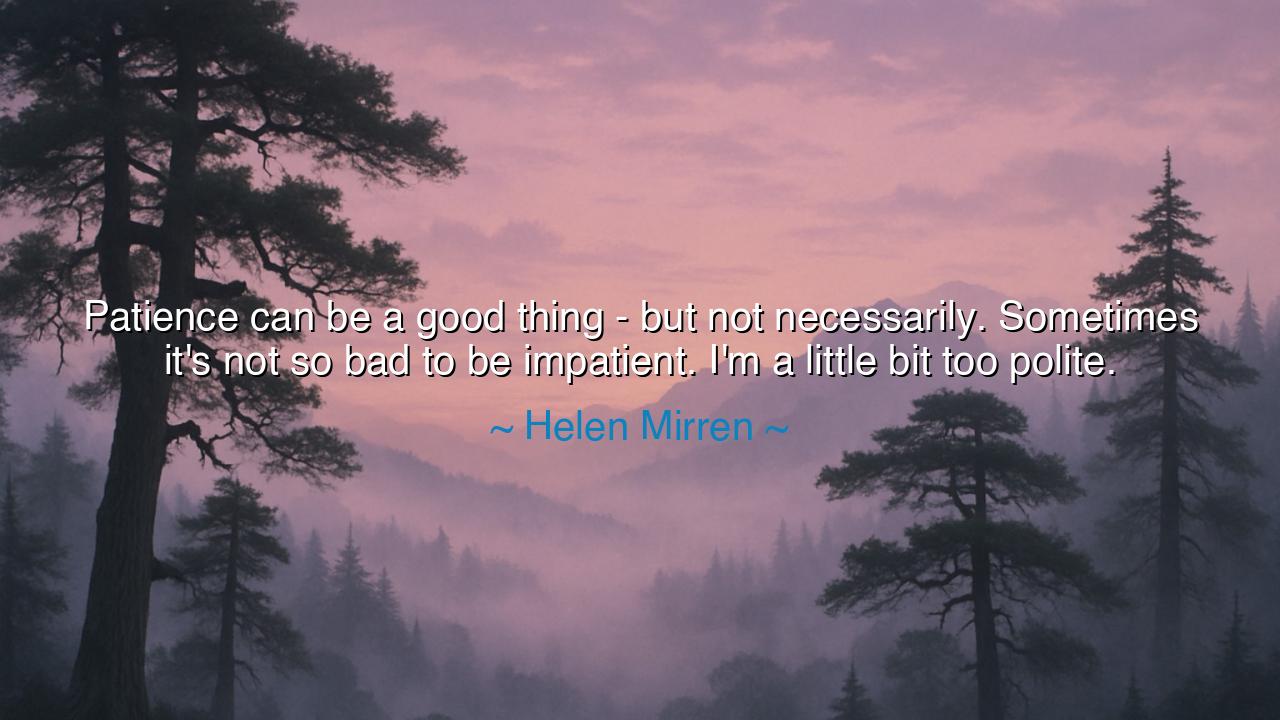
Patience can be a good thing - but not necessarily. Sometimes
Patience can be a good thing - but not necessarily. Sometimes it's not so bad to be impatient. I'm a little bit too polite.






The words of Dame Helen Mirren strike like a two-edged sword: “Patience can be a good thing – but not necessarily. Sometimes it’s not so bad to be impatient. I’m a little bit too polite.” At first glance, these seem the musings of a great actress reflecting on her nature. Yet beneath their surface lies a deep current of wisdom, flowing like a hidden spring through the caverns of human experience. For what is patience, if not the art of enduring time? And what is impatience, if not the fire that refuses to wait while destiny sleeps?
From the earliest days of humankind, sages praised patience as a virtue. The farmer tills the soil and waits for the rains; the lover endures separation in hope of reunion; the soldier stands silently until the moment to strike. Patience teaches humility before forces greater than ourselves. But Mirren reminds us that patience, if worshiped too blindly, may become a chain rather than a gift. To wait endlessly, to be forever polite, may silence the voice that longs to cry out against injustice, or bind the will that yearns to leap into the world’s arena.
Consider the tale of Alexander of Macedon, called the Great. He was not patient when others counseled delay. He was restless, impatient for glory, for conquest, for the weaving of a new world from East and West. Had he been endlessly patient, waiting for perfect conditions, he might have grown old in his homeland, forgotten among cautious men. Instead, his impatience carved empires, shattered walls, and redrew the maps of civilization. In his fiery refusal to wait, he changed history itself.
Yet there is balance in all things. For where Alexander’s impatience built an empire, it also hastened his end. He died young, consumed by the very fire that drove him. Thus Mirren’s words warn us: patience is not always good, nor is impatience always ruinous. The virtue lies not in clinging to one alone, but in discerning the moment when each must reign. The wise learn to stand still as the mountain when time requires, and to move swift as the storm when delay would mean death of the spirit.
Mirren’s self-reflection—“I’m a little bit too polite”—reveals another dimension. Politeness is kin to patience, for it often means yielding space, holding one’s tongue, waiting so that others may speak. This is a gentle strength, yet if carried too far, it can drown the voice of truth. There are times when the world needs thunder, not whispers; action, not courteous delay. In art, in politics, in love, the timid spirit who waits too long may watch opportunities pass like ships fading into the horizon.
The lesson for us, children of this age, is clear: do not cling blindly to patience as though it were the highest crown. Nor should you scorn it entirely, chasing every impulse without measure. Instead, listen to the rhythm of the hour. When waiting allows growth, like a seed beneath the soil, be still. But when waiting means surrendering your destiny, rise up with boldness, cast off politeness, and act. For the world has been changed not only by the patient who endure, but also by the impatient who refuse to wait any longer.
In your own life, test this wisdom. When you feel the weight of endless waiting, ask yourself: is this the patience of the strong, or the passivity of the fearful? When you burn with impatience, ask: is this the flame of purpose, or the fire of folly? In this discernment lies power. To practice it, take small actions each day—speak when silence weighs heavy on your chest, act when hesitation grips your hand, but wait when the fruit is not yet ripe.
Thus, Mirren’s words echo like a timeless teaching: patience is a noble companion, but never a tyrant. Impatience, though dangerous, can be the spark that ignites greatness. May you, O listener, walk the middle path between the stillness of the earth and the fire of the storm. And when the hour comes, may you know when to wait like a saint, and when to strike like a hero.






AAdministratorAdministrator
Welcome, honored guests. Please leave a comment, we will respond soon